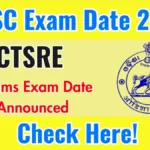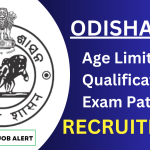The OSSC CGL (Odisha Staff Selection Commission Combined Graduate Level) exam is one of the most sought-after competitive exams in Odisha. It attracts thousands of candidates every year who aspire to secure government jobs through this rigorous selection process. The exam is structured to evaluate candidates’ knowledge in various subjects, including General Awareness, Quantitative Aptitude, English, and General Studies. Understanding the syllabus for this exam is crucial for effective preparation.
In this article, we’ll break down the OSSC CGL syllabus for 2025, including the structure, important topics, and study tips to help you prepare efficiently. We will also provide an overview of the syllabi from the past five years, outlining any major changes and trends.
Overview of the OSSC CGL Syllabus (2025)
The OSSC CGL exam for 2025 will focus on multiple sections, each testing different areas of a candidate’s knowledge and skills. The syllabus typically consists of four major sections: General Awareness, Quantitative Aptitude, English Language, and General Studies. Let’s break it down:
1. General Awareness
This section evaluates candidates’ knowledge of current events, history, geography, economics, and general science. The focus is on both national and international awareness.
-
Key Topics:
-
Indian History and Culture
-
Geography (Indian and World)
-
Indian Economy and Finance
-
Current Affairs (National and International)
-
Science and Technology
-
-
Skills Developed:
-
Staying updated on current affairs
-
Understanding basic concepts of history and geography
-
Developing general knowledge relevant for civil services and public sector roles
-
2. Quantitative Aptitude
The Quantitative Aptitude section tests a candidate’s mathematical ability and problem-solving skills. This includes basic arithmetic, algebra, geometry, and data interpretation.
-
Key Topics:
-
Number Systems
-
Percentage, Profit & Loss
-
Time & Work, Speed & Distance
-
Data Interpretation
-
Algebra and Geometry
-
-
Skills Developed:
-
Enhancing mathematical problem-solving skills
-
Developing logical reasoning abilities
-
Improving speed and accuracy in solving mathematical problems
-
3. English Language
This section evaluates the candidates’ proficiency in the English language, including their ability to understand and use language effectively.
-
Key Topics:
-
Vocabulary (Synonyms, Antonyms)
-
Grammar (Tenses, Articles, Prepositions)
-
Sentence Correction
-
Reading Comprehension
-
Cloze Test
-
-
Skills Developed:
-
Improving written and verbal communication
-
Enhancing comprehension skills
-
Mastering grammar and vocabulary usage
-
4. General Studies
The General Studies section is designed to test the candidate’s understanding of various subjects that are important for a government job role.
-
Key Topics:
-
Indian Polity and Governance
-
Indian History and Culture
-
Environmental Studies
-
Logical Reasoning
-
Science and Technology
-
-
Skills Developed:
-
Understanding the political, social, and economic systems of India
-
Developing analytical skills and logical reasoning
-
Awareness of environmental issues and scientific advancements
-
Examination Pattern and Weightage
The OSSC CGL exam consists of multiple-choice questions (MCQs) with different weightages assigned to each section. The exam is usually conducted in multiple stages, including a preliminary exam and a main exam.
-
Preliminary Exam:
-
Objective Type Questions (MCQs)
-
General Awareness, Quantitative Aptitude, and English Language
-
Total Marks: 150-200
-
Negative Marking: 0.25 marks for each wrong answer
-
-
Main Exam:
-
In-depth questions based on the syllabus
-
Total Marks: 300
-
Sections: General Studies, Quantitative Aptitude, and English Language
-
Negative Marking: 0.25 marks for incorrect answers
-
Study Materials and Recommended Books
Here’s a list of some of the best books and resources for OSSC CGL exam preparation:
-
General Awareness:
-
General Knowledge by Manohar Pandey
-
Lucent’s General Knowledge
-
-
Quantitative Aptitude:
-
Quantitative Aptitude for Competitive Examinations by R.S. Aggarwal
-
Fast Track Objective Arithmetic by Rajesh Verma
-
-
English Language:
-
Objective General English by SP Bakshi
-
Word Power Made Easy by Norman Lewis
-
-
General Studies:
-
Indian Polity by M. Laxmikanth
-
Environment and Ecology by D. K. Kothari
-
Syllabus Breakdown from Previous Years
The syllabus for the OSSC CGL exam has remained largely consistent over the last five years. However, there have been a few adjustments made to reflect current trends and to emphasize certain subjects.
Changes from Previous Years:
-
2019: Focused more on Indian History and Economy.
-
2020: Emphasized Environmental Studies and Logical Reasoning.
-
2021: Increased focus on Current Affairs and General Science.
-
2022: Introduced more complex Data Interpretation in Quantitative Aptitude.
-
2023: Shifted towards practical knowledge in General Studies, including Governance and Policy-related topics.
Study Tips for Effective Preparation:
-
Create a Study Plan: Develop a realistic timetable, allocating sufficient time to each section. Focus on weaker areas first, and gradually increase your focus on stronger topics.
-
Stay Updated on Current Affairs: Follow newspapers, magazines, and online news portals to stay informed about the latest developments in national and international affairs.
-
Practice Mock Tests: Regularly take mock tests and practice previous years’ papers to get a feel for the exam pattern and time management.
-
Revise Regularly: Set aside time each week for revision to reinforce what you’ve learned and ensure it stays fresh in your mind.
-
Group Studies: Occasionally study in groups to exchange knowledge and ideas, which can be helpful for complex topics.
By following this comprehensive syllabus guide and study plan, you’ll be well-equipped to tackle the OSSC CGL exam with confidence. Whether you’re a first-time candidate or a repeat aspirant, understanding the syllabus and preparing methodically will increase your chances of success.
FAQ for OSSC CGL Syllabus
1. What is the OSSC CGL syllabus for 2025?
The OSSC CGL syllabus for 2025 consists of four major sections: General Awareness, Quantitative Aptitude, English Language, and General Studies. Each section focuses on different aspects of knowledge and skills, including history, mathematics, language proficiency, and current affairs. Detailed topics for each section include Indian History, Geography, General Science, English Grammar, and Logical Reasoning, among others.
2. How many sections are there in the OSSC CGL syllabus?
The OSSC CGL syllabus is divided into four sections:
-
General Awareness
-
Quantitative Aptitude
-
English Language
-
General Studies
Each section has a set of topics designed to test your overall knowledge and aptitude across various subjects.
3. Are there any changes in the OSSC CGL syllabus from previous years?
While the core structure of the syllabus has remained the same over the years, there have been a few changes. For example, there has been an increased emphasis on Current Affairs, Environmental Studies, and Logical Reasoning in recent years. The Quantitative Aptitude section has also seen more focus on Data Interpretation in the last two years.
4. What is the exam pattern for the OSSC CGL exam?
The OSSC CGL exam consists of multiple-choice questions (MCQs) in both the preliminary and main exams. The preliminary exam tests General Awareness, Quantitative Aptitude, and English Language. The main exam focuses on in-depth questions from the same sections, with a larger mark distribution. Negative marking of 0.25 marks applies for each incorrect answer.
5. What are the recommended books for OSSC CGL preparation?
For effective preparation, you can refer to the following books:
-
General Knowledge: Lucent’s General Knowledge, General Knowledge by Manohar Pandey
-
Quantitative Aptitude: Quantitative Aptitude for Competitive Examinations by R.S. Aggarwal, Fast Track Objective Arithmetic by Rajesh Verma
-
English Language: Objective General English by SP Bakshi, Word Power Made Easy by Norman Lewis
-
General Studies: Indian Polity by M. Laxmikanth, Environment and Ecology by D.K. Kothari
6. How should I prepare for the General Studies section of the OSSC CGL exam?
To prepare for General Studies, focus on the following key areas:
-
Indian Polity and Governance
-
Indian Economy and Finance
-
Geography (Indian and World)
-
History (Indian and World)
-
Environment and Ecology
Keep up with current affairs and follow government websites, newspapers, and magazines to stay updated.
7. Is there any negative marking in the OSSC CGL exam?
Yes, there is negative marking in the OSSC CGL exam. For every incorrect answer, 0.25 marks will be deducted from the total score. It is important to be careful while answering the questions to avoid unnecessary deductions.
8. How do I manage time during the OSSC CGL exam?
Time management is crucial in the OSSC CGL exam. Practice solving previous years’ papers and mock tests to get a feel for the exam’s timing. Allocate time to each section based on your strengths and weaknesses, and ensure you complete each section within the given time limit.
9. What is the selection process for the OSSC CGL exam?
The selection process for the OSSC CGL exam includes two main stages:
-
Preliminary Exam: Objective-type questions from General Awareness, Quantitative Aptitude, and English Language.
-
Main Exam: In-depth questions from the same subjects, designed to test candidates’ knowledge and problem-solving skills. After the written exams, candidates may also be required to attend a skill test or interview, depending on the job role.
10. Can I download the OSSC CGL syllabus?
Yes, the OSSC CGL syllabus is available on the official OSSC website for download. You can access the syllabus and keep it handy to refer to during your preparation.
11. How can I stay updated on current affairs for the OSSC CGL exam?
To stay updated on current affairs, regularly read newspapers like The Hindu, The Times of India, and online news portals. Additionally, following current affairs magazines such as Pratiyogita Darpan or Yojana can be helpful for preparing for the exam.
12. What is the best way to study for Quantitative Aptitude in OSSC CGL?
To study Quantitative Aptitude effectively:
-
Start by building a strong foundation with basic concepts.
-
Practice different types of questions, such as number systems, time & work, and data interpretation.
-
Use books like R.S. Aggarwal for practice and work on increasing your speed and accuracy.
-
Regularly take mock tests to evaluate your progress and adjust your study strategy accordingly.
Latest Posts
- Step-by-step guide to download and apply for jee mains admit card 202
- Comprehensive 2025 government holidays and recruitment details for job seekers
- JEE Mains Admit Card 2025: Your Step-by-Step Guide to Downloading the Hall Ticket
- Everything You Need to Know About 2025 Government Holidays Recruitment
- Comprehensive Guide to rrb d group recruitment 2025 – Eligibility, Vacancies, and Application
- Detailed guide to nps trust recruitment 2025 vacancies, eligibility and apply process
- Comprehensive guide to hpcl recruitment 2025 notification, vacancies, and application process
- ignou bed admission 2025 complete recruitment guide with eligibility and process
- Comprehensive Guide to Indian Army Agniveer Recruitment 2025 Notification and Jobs
- Everything You Must Know About CBSE Board Exams 2025 Changes & New Rules



